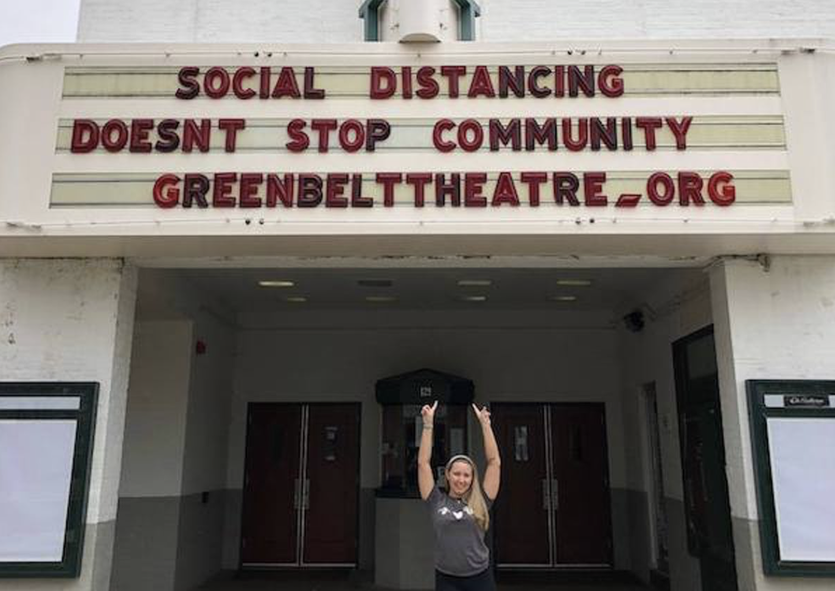COVID-19 and Cinema: How the Global Pandemic Has and Hasn’t Affected Theaters
By Jackie DiBartolomeo
December 16, 2020
Image Credit: Photo courtesy of Caitlin McGrath
With the surge of COVID-19 back in March, businesses and restaurants around the globe shut their doors to encourage social distancing and avoid in-person contact. One industry that has taken a hard hit is that of movie theaters. While some theaters have slowly opened back up with mask requirements and socially distanced seating, still more remain closed across the country, losing money by the minute. Many moviegoers have come to ask, will movie theaters survive the pandemic? Or will streaming finally become the number one way to watch movies?
Dr. Oliver Gaycken, an associate professor of cinema and media studies at the University of Maryland, believes movie theaters are here to stay, COVID-19 or not.
While an uptick in streaming movies has occurred due to the pandemic, movie theaters’ long processes of trial and error have created a force too formidable to disappear in one year, Gaycken said.
“There’s also a reason why institutions, like cinemas, look the way they do. It’s a very long process of refinement and evolution. So to think it’ll just disappear overnight, it’s wishful thinking,” Gaycken said.
If one looks at the economics of movie theaters, it doesn’t make sense for them to become obsolete anytime soon, said Dr. Caitlin McGrath, Executive Director of Friends of Greenbelt Theatre in the City of Greenbelt.
“Movies don’t make money on streaming, they make money in movie theaters. There’s no way to replicate that,” McGrath said.
People don’t mind paying for streaming services for a monthly fee, but if the services began charging extra money on top of the subscription to buy specific movies, they would not find any success, McGrath said. Disney Plus tried to do this with their new remake of their 1998 film Mulan, and their profits were much lower than expected, she said.
Other attempts to turn the movie industry on its head have failed as well, Gaycken said. MoviePass, a service founded in 2010 that allowed moviegoers to purchase up to three movie tickets per month for a monthly fee, became disastrous when moviegoers who bought the service were either going to too many movies or not enough each month. Changes like these to the movie industry are not easily accepted, he said.
Independent movie theaters, such as the Old Greenbelt Theatre, have been relying on their local following to remain afloat amongst closures, McGrath said.
As the only non-profit theater in Prince George’s County, the Old Greenbelt Theatre has been reaching out to its patrons for support, McGrath said. The theater is currently running an end of year fundraising campaign to close the gap of their losses of about $25,000.
“We’ve nearly reached our goal about 10 days into a 40-day campaign. There’s a lot of support out there for people who still want to have a cinema experience to return to once we’re able to do so safely,” McGrath said.
With COVID-19 on the rise again, some students don’t feel safe returning to movie theaters just yet.
Catherine Overman, a sophomore psychology major, does not yet think the experience of a movie theater is worth what she’s risking to her health.
“I wouldn’t go to the movie theaters right now; I don’t think it would be worth it weighing it against COVID-19,” Overman said.
While movie theaters still aren’t safe to return to, the experience of streaming from home is far less exciting, said Nicole O’Neill, a junior communications major.
“It’s definitely not the same as being able to go out with friends and see it on a huge screen with overpriced movie popcorn,” O’Neill said.
As COVID-19 rages on, movie theaters continue to struggle; but their 100-year lifetime proves that they aren’t going anywhere anytime soon, McGrath said.
“The arts in general often are underfunded and undervalued and underappreciated. And yet when the pandemic hit, this was one of the first things that people turned to: for comfort, for trying to make sense of what’s going on. I would hope there’s a little bit of that left over,” Gaycken said.
|
|
Learn more |
© COPYRIGHT 2020. ALL RIGHTS RESERVED.
|
